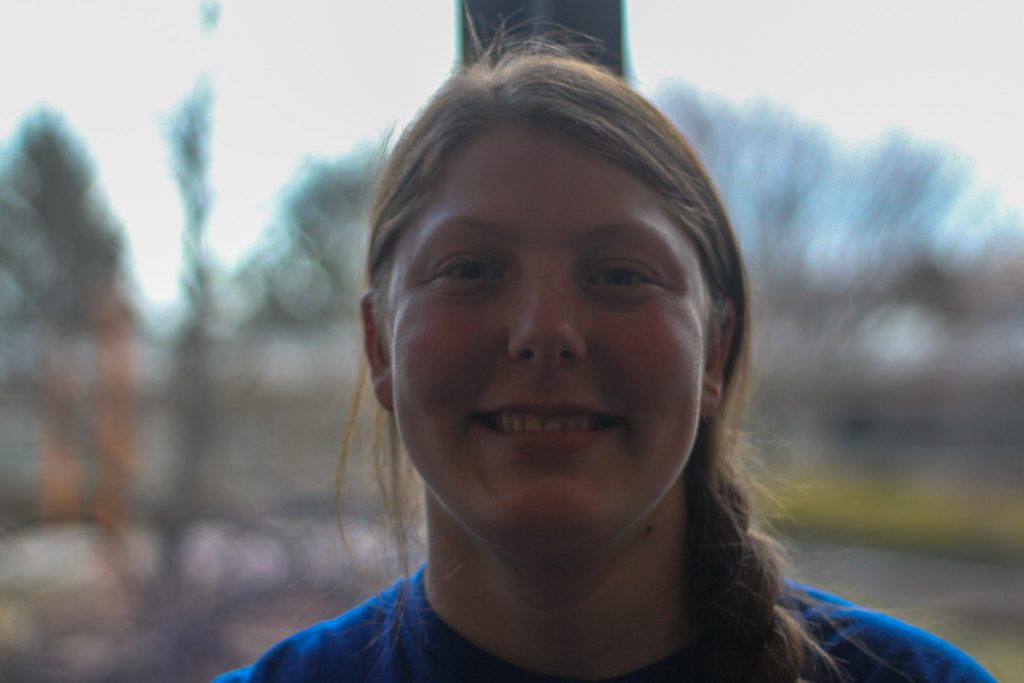Pipe Dream sat down with Caitlyn Archibald, a freshman double-majoring in biochemistry and history. During her first semester, she has been a part of the Binghamton University Scholars Program and club rugby. In her free time, she reads, crochets and takes care of her dorm plants. This interview has been edited for length and clarity.
Q: Tell me a little about yourself and your background.
A: ”I’m from Rochester, New York, which is around three hours from here, upstate. I went to a small high school up there. I’ve always played sports, and I played soccer and lacrosse, and I guess I’ve always been surrounded by people who have supported me all the way — and I feel like that’s really helped me toward this [TEDx] talk. I’m on the club rugby team here so I practice with them the majority of the time, and since I’m on the pre-med track, I’ve joined a couple of stem clubs on campus. I’m a part of the biochemistry club, the chemistry club, the biological science club [and] the American Medical Women’s Association. So kind of just a theme that I guess connected to my talk is just I love being surrounded by strong women. So I kind of look out for that and every kind of extracurricular I do.”
Q: What inspired this talk?
A: “I have a little anecdote at the beginning. Basically, I was talking. I was interested in this guy, and he was like, ‘I can’t date you because you’re too feminist,’ and that really struck a nerve with me. It really just took me off guard and was something that I’ve never really heard before, and it was kind of just like, what does that mean? I’ve never really heard that before. So I took a class in high school that kind of focused on how society views feminism. So kind pairing that class with this experience with this guy — I really needed to talk about it because I was like, that’s not something that should happen. I feel a strong woman shouldn’t be intimidating. So that’s kind of what inspired it.”
Q: What involvement have you had on campus that feels relevant to your talk?
A: “So as I said, I’m part of the women’s rugby team. I’m surrounded by the strongest women I’ve ever encountered before. I absolutely adore these girls, and just the strength and support I feel from them. They really just support me in every avenue, and they’ve really shown me that I shouldn’t be scared of being a strong, powerful advocate for feminism and I should be able to talk about things that make society uncomfortable and it shouldn’t make them uncomfortable, but I should be able to talk about it freely. So I would say the rugby team has a really big support system I have that really impacted me.”
Q: Why did you want to get involved in TEDxBinghamtonUniversity?
A: “So one of my favorite professional athletes is Victoria Garrick. She played D1 volleyball with [the University of Southern California (USC)]. She was a walk-on as a D1 player, so that was really unheard of, and she was their starting libero all four years, and she gave a TED Talk — TEDx USC. She gave a talk about how [mental health] was called the hidden opponent. So basically, she gave a talk about how D1 athletes really struggle with mental health and how they’re playing and working out and all [those] practices are prioritized and our physical health are prioritized so much more than their mental health. And so she gave that talk about it and she’s one of my biggest role models — and just her giving a talk was amazing and I’ve always wanted to give one and I honestly didn’t even know that was an opportunity here. I’m a first year so, I saw a flyer in the lecture hall. And I was like, ‘That looks really cool.’ Like Victoria, I can give a talk, and so I kind of just submitted an application just to do it. I didn’t really expect anything out of it because I’m a first year and obviously with things like that, you kind of expect more experienced students, but I was so surprised. I’m really grateful. But yeah, it was kind of just her honestly on why I wanted to give one.”
Q: “What do you hope people take away from your talk?”
A: “I hope that people take away that there are so many things in society that are considered taboo and shouldn’t be talked about and I feel like one of those is feminism. There are so many things that make people uncomfortable with it, and I feel it just isn’t. It doesn’t need to be that. I feel like feminism can be addressed in a way that is comfortable for everyone in the conversation — and I feel like if it’s a female-dominated conversation, we’re not getting anything done. So I am giving a conversation about feminism today in hopes that women, men and everyone can take something away from this talk and they can improve simple things like language or just actions and small things that are said during conversations. Hopefully eliminating those small talk things will just help toward making feminists a little more approachable conversation topic.”



